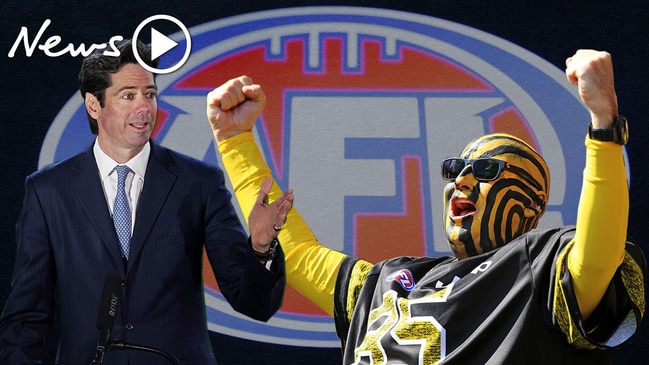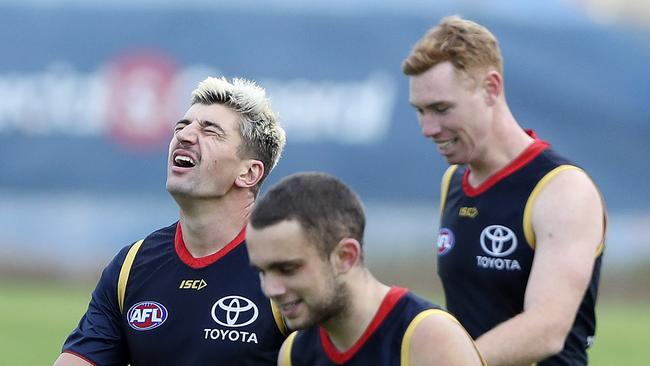David Penberthy: Why the 2020 AFL season can’t be revived
Sporting fanatics cheered at the news that footy was set to return to our lives. But without its most crucial element, the game means nothing, writes David Penberthy.

Rendezview
Don't miss out on the headlines from Rendezview. Followed categories will be added to My News.
Some time ago, I sat down and calculated how much of my year was devoted to watching football.
Not counting school footy, which I coached after a fashion and which took up about five hours a week, the rough estimate was that by attending seven or eight SANFL games a year and almost every Crows home game, and watching every Crows away game on TV, as well as most Port games and a couple of interstate matches, I was spending about 250-300 hours – or up to 12 days a year – watching professional football.
There’s an awful lot you can do with that kind of time. My last overseas holiday didn’t last that long.
That’s not to say all that time is a total waste, of course. Some of those hours are exhilarating, others morbidly depressing where losing by less than a kick on the siren galvanises you in a kind of convivial misery with your fellow fans, meaning you at least get an emotional reaction from it all.
But most of what passes for professional sport is eminently forgettable, and if you think about how much time it consumes, you can actually resent it.
Such as a Friday night “blockbuster” where Carlton are six goals behind at quarter-time and stay there until the final siren. Or some meandering, wet-weather encounter between Brisbane and Freo in the dire 4pm timeslot on a Sunday, which you watch simply because you can’t think of anything else to do.

All this adds up to life simply ebbing away. The impact of the pandemic has been to reinsert those 300 hours in the diary to be filled in other ways.
There would be plenty of people reading this for whom 300 hours is barely scratching the surface of annual sporting consumption.
Instead, for the past three months, we have found ourselves playing board games, reading more books, watching great documentaries and miniseries and revisiting old films. People have gardened more, cooked more, played more records. In our case, we have made three visits to the Belair National Park for bushwalks in the past month, a place we had only visited once before with our two young kids.
Much has been said about the immediate financial impact on the AFL and NRL through membership refunds or suspensions, the loss of merchandise, and the huge hit from TV rights and advertising revenue built around games.
These are immediate challenges, but my suspicion is there may be a longer-term one for the popularity of sport. Don’t get me wrong, I would love nothing more than to be among the crowd at a close Showdown or standing in the outer at Unley listening to ratbag fans heckle the opposition on a drizzly Saturday arvo.

I have no doubt that when the fans can return to games they will do so in droves, as initially it will be a cause for collective celebration, a mass event where people come together with the sole intention of enjoying themselves.
But, aside from the thrill of attendance, the extent to which we let things such as footy frame our lives for seven months of the year is something many of us will question.
I have pretty much zero interest or care in the resumption of the AFL this year. The season feels totally meaningless. Round one was one of the most miserable things I have ever seen.
Even with my team playing surprisingly good footy at the start of that game, only to lose narrowly on account of going to sleep for a while, there was nothing remotely thrilling about the match.
Round one proved that footy is nothing without the fans. And there is every chance that, when round two starts, aside from the novelty of having a Showdown, many of us will tune in for a few minutes and go – oh yeah, that’s right, this is actually crap.
Beyond the removal of fans from the equation, the danger for the AFL and NRL is that, now that families have rekindled their love of shared activities of a non-televisual kind, we will all think twice about tuning in on a Friday night to watch Carlton lose again, or hitting the couch at 4pm on a Sunday to watch the tedium of the Brisbane-Fremantle game.

For all the job-wrecking horrors and health-related tragedies of this pandemic, I know plenty of people who have actually said that parts of the lockdown have been a genuine joy.
I’ve even heard people talk about the lockdown as if they are going to miss it.
A huge part of that has been the removal of sport as an all-consuming ordering system for the remainder of our lives, whereby the first question that must be asked when planning the weekend is: Well, what games are on?
On radio, we interviewed a priest the other day about the manner in which the discussion of football resuming and pubs opening has consumed so much coverage of the emergence from lockdown.
For many people, their main question was when could they all congregate together as they normally do on a Sunday.
The priest, Dr Steven Ogden, from St Oswalds Anglican Church in Parkside, said he believed that during the lockdown many people had become more reflective and cerebral, and had found themselves questioning what really matters in life.
He predicted there could be something of a post-lockdown renaissance in his line of business.
As an officially lapsed Methodist, I’m still not sure if I would go quite that far. But there is something in what the reverend said, because not automatically sitting at the altar of Brisbane-Fremantle on a Sunday has been one of the best parts of being locked down by far.

